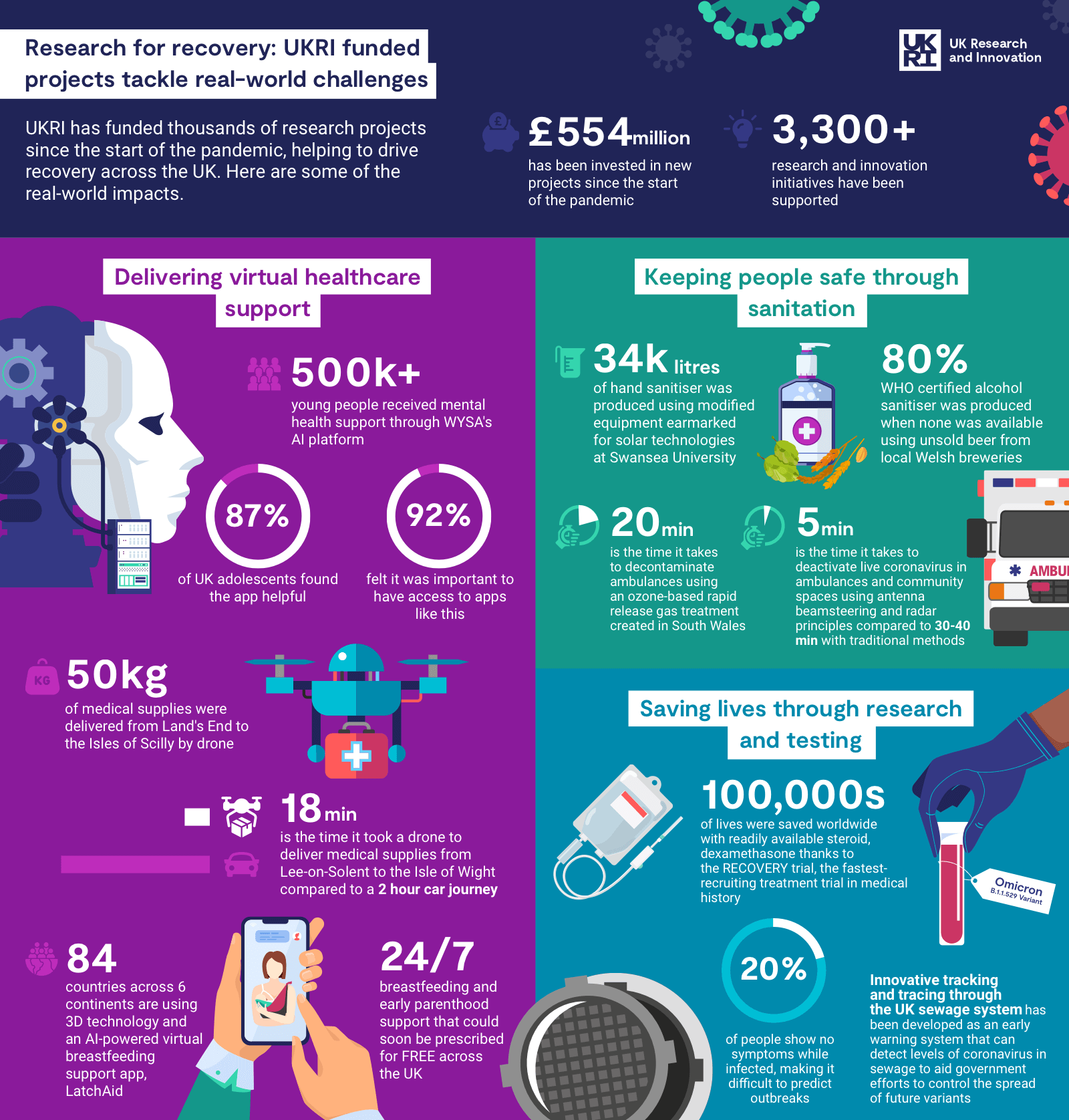
News
Research for Recovery: UKRI funded projects tackle real-world challenges
Date: June 14, 2022
The widespread devastation caused by COVID-19 disrupted livelihoods and communities worldwide, inspiring the rise of thousands of research initiatives to counteract the public health crisis.
UK Research and Innovation (UKRI) has designed a Research for Recovery Infographic detailing some of the 3,600 UKRI-funded research projects that have provided a solid foundation for post-pandemic recovery and been instrumental in tackling pandemic-related challenges.

Key statistics illustrated by the infographic include:
• £554 million has been invested in new projects since the start of the pandemic
• 34,000 litres of hand sanitiser was produced using modified equipment earmarked for solar technologies at Swansea University
• 500,000+ young people received mental health support through WYSA’s AI platform
• 100,000s of lives were saved worldwide with readily available steroid dexamethasone thanks to the RECOVERY trial – the fastest-recruiting treatment trial in medical history
• 50kg of medical supplies were delivered from Land’s End to the Isles of Scilly by drone
Sanitation innovation: supplying much-needed sanitiser to the front line
In general, hand hygiene is deemed the cornerstone of infection prevention and hand sanitiser, promoted as a highly effective preventative tool against coronavirus, is low-cost and broadly accessible. However, during the first few months of the outbreak, with a rapidly increasing demand for disinfectant gel, stocks were quickly diminished.
A volunteer group from South Wales donated and redesigned equipment formerly destined for solar technologies to institutions devoted to relief work. Their efforts produced an incredible 5000 litres of hand sanitiser per week, distributed to the NHS, care homes, schools, homeless hostels and carers and maintenance workers in at-risk settings.
The SPECIFIC Innovation and Knowledge Centre at Swansea University harnessed a team of more than 30 volunteers and repurposed funding to provide frontline support in the fight against COVID-19.
The team devised a multi-head bottling machine with the capacity of filling a 5-litre bottle in approximately 20 seconds. A collaboration with local brewers, stocked with surplus unsold beer produced a WHO certified 80% alcohol sanitiser, transported in Electric Vehicles.
Fresh air solution: reducing health risks for London bus drivers
Transport for London implemented improved ventilation systems on more than 1,200 buses and reinforced drivers’ protective screens. London buses have been fitted with a device to allow additional ventilation for drivers to reduce the risk of catching respiratory diseases such as COVID-19. Drivers no longer have to breathe in air from the passenger zones and are receiving over 100 changes of outside fresh air every hour, directly into their compartments.
Bus drivers were at high risk during the first wave of the pandemic, as transport by bus remained the only means of travel for 60% of the capital. Research explored how COVID-19 spreads on public transport and how transmission can be reduced, examining pathways and air quality and investigating how SARS-CoV-2 carrying droplets might disperse within the bus.
A team at UCL replicated conditions on a bus using computer simulation; hotspots of contamination were identified by mimicking passenger behaviour and air flows, and samples were collected to measure air quality. This enabled scientists to study how air particles moved and settled and make recommendations to TfL, subsequently allowing the safe return of front-door boarding, encouraging revenue flow and reducing passenger interactions at the centre door.
Research for recovery: UKRI funded projects tackle real-world challenges
UKRI has funded thousands of research projects since the start of the pandemic, helping to drive recovery across the UK. Here are some of the real-world impacts:
- £554 million has been invested in new projects since the start of the pandemic
- 3,300+
research and innovation initiatives have been supported
Section 1
Keeping us connected through tech-powered healthcare
- 500,000+ young people received mental health support through WYSA’s AI platform
- 87% of UK adolescents found the app helpful
92% felt it was important to have access to apps like this - After using Wysa, young people’s perceived wellness scores increased over 2 weeks of usage
Delivering virtual healthcare support
- 50kg of medical supplies were delivered from Land’s End to the Isles of Scilly by drone
- 18 minutes is the time it took a drone to deliver medical supplies from Lee-on-Solent to the Isle of Wight compared to a 2 hr car journey
Supporting health and wellbeing through AI innovation
- 84 countries across 6 continents are using 3D technology and an AI-powered virtual breastfeeding support app, LatchAid
- 24/7 breastfeeding and early parenthood support that could soon be prescribed for FREE across the UK
Section 2
Rapid response accelerating sanitation
- 34,000 litres of hand sanitiser was produced using modified equipment earmarked for solar technologies at Swansea University
- 80% WHO certified alcohol sanitiser was produced when none was available using unsold beer from local Welsh breweries
Keeping people safe through sanitation
- 20 minutes is the time it takes to decontaminate ambulances using an ozone-based rapid release gas treatment created in South Wales
- 5 minutes is the time it takes to safely deactivate live coronavirus in ambulances and community spaces using antenna beamsteering and radar principles compared to 30-40 minutes with traditional methods
Section 3
Saving lives through research and testing
100,000s of lives were saved worldwide with readily available steroid, dexamethasone thanks to the RECOVERY trial – the fastest-recruiting treatment trial in medical history
RECOVERY is now testing other treatments internationally to continue to help clinicians around the world provide the best treatments for hospitalised patients

